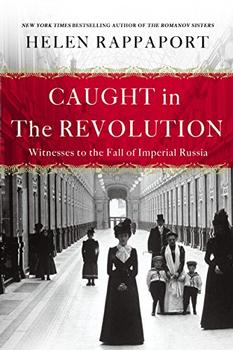Summary | Excerpt | Reviews | Beyond the Book | Readalikes | Genres & Themes | Author Bio

Petrograd, Russia, 1917 - A World on the Edge
by Helen Rappaport
Seymour's eighteen-year-old fellow VAD, Enid Stoker, was not having an easy time of it. She was shocked by the level of suffering endured by the wounded – shocked in equal measure to her admiration of their stoicism in extremis and their simple peasant faith, expressed in frequent prayers before the icons that hung in the corners of their wards. They sang a lot and played the balalaika and had a childlike gratitude that touched her, but some of their stories were heartbreaking. She remembered one young soldier, Vasili, from Siberia who had had both legs amputated. One day he was lying on the top of his bed with his stumps on a pillow, 'when an old peasant came into the ward. He had travelled, goodness knows how, nearly a thousand miles to see his son,' as Stoker recalled. But as soon as he saw him, he began to shout, 'the tears pouring down his cheeks'. Stoker was dismayed to be told by their interpreter that the old man was cursing the boy:
Why hadn't he died? Then they would have got a small pension for him – now look at him, a hopeless burden. How could he work on the farm now? Just another useless mouth to feed and they were nearly starving already.
In Russia there were by now more than 20,000 repatriated soldiers who had lost either arms or legs. Dorothy Seymour rather enjoyed her work taking men such as these – 'the cripples' – out for drives in droshkies around snow-covered Petrograd and treating them to tea. Some of them had never left their villages till they were conscripted, and after months on end in the hospital had not yet had sight of the capital. It was better than sitting rolling bandages all day. Much to Lady Buchanan's chagrin, Seymour – thanks to her position at the British court, with the Tsaritsa's aunt, Princess Helena – was delighted to receive a personal invitation to visit her at Tsarskoe Selo. How could she resist the opportunity to see a woman who was 'busy making history that will count large in the future'? The words were rather more prophetic than Seymour could have imagined.
By January 1917 the Petrograd winter was wearing down everyone at the hospital. Lady Paget's deputy, Lady Sybil Grey (another well-connected aristocrat who was the daughter of a former Governor-General of Canada), was finding the cold hard to endure. 'The sun doesn't shine like in Canada,' she wrote in her diary. 'If people like us rarely get our rooms above 50° what must it be for the poor?' Yet the city could still look spectacular: St Isaac's Cathedral, which could be seen from the hospital, 'lately completely covered with snow is quite beautiful, pillars and all looking like white alabaster, bronze statues against the white, the whole surmounted by a golden dome. The two lovely slender graceful gold spires take every glimpse of sunshine one ever gets.' For all the privations, Grey – like other nurses at the ARH – acknowledged that there was something exhilarating about the place: 'I wouldn't be out of Russia for anything now.' She was certain that the recent murder of Rasputin had been the prelude to something far more dramatic. 'It is curious isn't it that things of immense moment and importance can only be accomplished by intrigue and murder,' she wrote home, referring to the killing of Rasputin by close members of the royal family, Prince Felix Yusupov and Grand Duke Dmitri Pavlovich. 'Can you imagine Tecks, Connaughts etc. doing the like in England?'
While Seymour was keen to stay and watch events unfold, elsewhere in Petrograd there were British nationals, such as nurses Grant and Moir, who were desperate to get home. British consul Arthur Woodhouse, based in offices on Teatralnaya Ploshchad near the Mariinsky Theatre, had been busy since the outbreak of the war helping repatriate British subjects stranded all over Russia – from the Baltic to the Urals. 'There was a stream of people wanting to go home, which was to turn into a flood, with the refugees from territories overrun by the Germans,' recalled his daughter Ella, noting that many of them were 'those who had lost their jobs in the general upheaval, like the hundreds of governesses who had been employed by wealthy families all over the country … After years abroad, these pathetic women were returning to the old country, many of them with no real homes to go back to.' It was a sad sight; 'such numbers of them came in tears that we named them the H.H.H. class (helpless, hopeless, hystericals)'.
Excerpted from Caught in the Revolution by Helen Rappaport. Copyright © 2017 by Helen Rappaport. Excerpted by permission of St. Martin's Press. All rights reserved. No part of this excerpt may be reproduced or reprinted without permission in writing from the publisher.




Music is the pleasure the human mind experiences from counting without being aware that it is counting
Click Here to find out who said this, as well as discovering other famous literary quotes!
Your guide toexceptional books
BookBrowse seeks out and recommends the best in contemporary fiction and nonfiction—books that not only engage and entertain but also deepen our understanding of ourselves and the world around us.